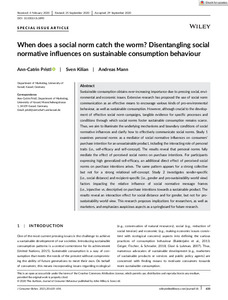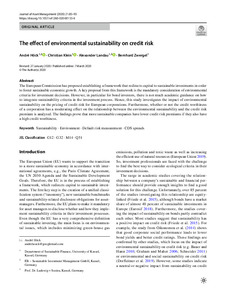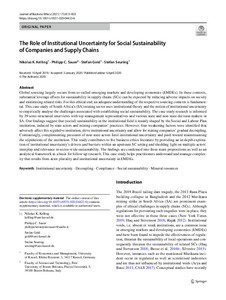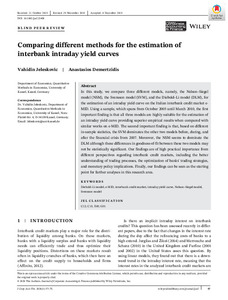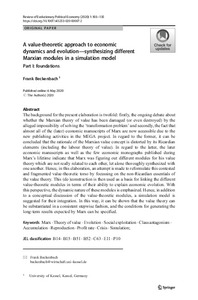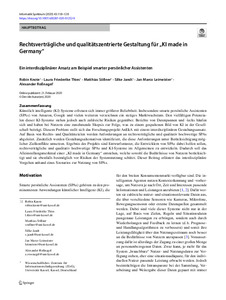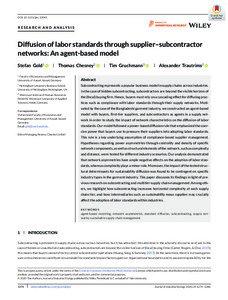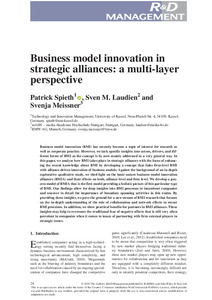Suche
Anzeige der Dokumente 11-20 von 22
Aufsatz

 When does a social norm catch the worm? Disentangling social normative influences on sustainable consumption behaviour
When does a social norm catch the worm? Disentangling social normative influences on sustainable consumption behaviour
(2020-11-08)
Sustainable consumption obtains ever-increasing importance due to pressing social, environmental and economic issues. Extensive research has proposed the use of social norm communication as an effective means to encourage various kinds of pro-environmental behaviour, as well as sustainable consumption. However, although crucial to the development of effective social norm campaigns, tangible evidence for specific processes and conditions through which social norms foster sustainable consumption remains scarce. Thus, ...
Aufsatz

 The effect of environmental sustainability on credit risk
The effect of environmental sustainability on credit risk
(2020-03-07)
The European Commission has proposed establishing a framework that redirects capital to sustainable investments in order to foster sustainable economic growth. A key proposal from this framework is the mandatory consideration of environmental criteria for investment decisions. However, in particular for bond investors, there is not much academic guidance on how to integrate sustainability criteria in the investment process. Hence, this study investigates the impact of environmental sustainability on the pricing of ...
Aufsatz

 The Role of Institutional Uncertainty for Social Sustainability of Companies and Supply Chains
The Role of Institutional Uncertainty for Social Sustainability of Companies and Supply Chains
(2020-04-06)
Global sourcing largely occurs from so-called emerging markets and developing economies (EMDEs). In these contexts, substantial leverage effects for sustainability in supply chains (SCs) can be expected by reducing adverse impacts on society and minimising related risks. For this ethical end, an adequate understanding of the respective sourcing contexts is fundamental. This case study of South Africa’s (SA) mining sector uses institutional theory and the notion of institutional uncertainty to empirically analyse the ...
Aufsatz

 Comparing different methods for the estimation of interbank intraday yield curves
Comparing different methods for the estimation of interbank intraday yield curves
(2020-01-16)
In this study, we compare three different models, namely, the Nelson–Siegel model (NSM), the Svensson model (SVM), and the Diebold–Li model (DLM), for the estimation of an intraday yield curve on the Italian interbank credit market e‐MID. Using a sample, which spans from October 2005 until March 2010, the first important finding is that all three models are highly suitable for the estimation of an intraday yield curve providing superior empirical results when compared with similar works on e‐MID. The second important ...
Aufsatz

 A value-theoretic approach to economic dynamics and evolution—synthesizing different Marxian modules in a simulation model
A value-theoretic approach to economic dynamics and evolution—synthesizing different Marxian modules in a simulation model
(2020-05-06)
The background for the present elaboration is twofold: firstly, the ongoing debate about whether the Marxian theory of value has been damaged (or even destroyed) by the alleged impossibility of solving the ‘transformation problem’ and secondly, the fact that almost all of the (later) economic manuscripts of Marx are now accessible due to the new publishing activities in the MEGA project. In regard to the former, it can be concluded that the rationale of the Marxian value concept is distorted by its Ricardian elements ...
Aufsatz

 Rechtsverträgliche und qualitätszentrierte Gestaltung für "KI made in Germany"
Rechtsverträgliche und qualitätszentrierte Gestaltung für "KI made in Germany"
(2020-02-21)
Künstlich intelligente (KI) Systeme erfreuen sich immer größerer Beliebtheit. Insbesondere smarte persönliche Assistenten (SPAs) von Amazon, Google und vielen weiteren verzeichnen ein stetiges Marktwachstum. Den vielfältigen Potenzialen dieser KI-Systeme stehen jedoch auch zahlreiche Risiken gegenüber. Berichte von Datenpannen und -lecks häufen sich und haben bei Nutzern eine zunehmende Skepsis zur Folge, was zu einem gespaltenen Bild von KI in der Gesellschaft beiträgt. Diesem Problem stellt sich das Forschungsprojekt ...
Aufsatz

 Diffusion of labor standards through supplier–subcontractor networks: An agent‐based model
Diffusion of labor standards through supplier–subcontractor networks: An agent‐based model
(2020-06-22)
Subcontracting represents a popular business model in supply chains across industries. In the case of hidden subcontracting, subcontractors are beyond the visible horizon of the (focal) buying firm. Hence, buyers must rely on a cascading effect for diffusing practices such as compliance with labor standards through their supply networks. Motivated by the case of the Bangladeshi garment industry, we constructed an agent‐based model with buyers, first‐tier suppliers, and subcontractors as agents in a supply network in ...
Aufsatz

 Bewusstes und unbewusstes Denken von Experten und Novizen: Eine empirische Studie zur Qualität von Personalauswahlentscheidungen und Implikationen für die Beratung
Bewusstes und unbewusstes Denken von Experten und Novizen: Eine empirische Studie zur Qualität von Personalauswahlentscheidungen und Implikationen für die Beratung
(2020-09-29)
Die „Theorie des unbewussten Denkens“ (UTT) postuliert, dass Menschen in komplexen Situationen bessere Entscheidungen treffen, wenn sie unbewusst-intuitiv und nicht bewusst nachdenken. Inwieweit sich diese, fast ausschließlich im Bereich der Konsumgüterentscheidungen geprüfte Annahme, auch auf die Entscheidungsarbeit von Recruitern, Beratern oder Coaches übertragen lässt und welche Rolle hierbei ihrer Expertise zukommt, ist bisher weitgehend ungeklärt. In diesem Beitrag werden die UTT sowie die Relevanz der Expertise ...
Aufsatz

 A value-theoretic approach to economic dynamics and evolution—synthesizing different Marxian modules in a simulation model
A value-theoretic approach to economic dynamics and evolution—synthesizing different Marxian modules in a simulation model
(2020-05-08)
This part is devoted to simulation experiments based on the simulation model developed in part I from the value-theoretic reconstruction of the main parts of Marx’s critique of Political Economy. After introducing the main parameters and the range of their variation (Section 1), a singular run as well as a sensitivity analysis for the chosen standard configuration (‘moderation regime’) is presented in Section 2. This is accomplished by configurations depicting characteristics of the capitalist development emphasized ...
Aufsatz

 Business model innovation in strategic alliances: a multi‐layer perspective
Business model innovation in strategic alliances: a multi‐layer perspective
(2020-04-17)
Business model innovation (BMI) has recently become a topic of interest for research as well as corporate practice. However, we lack specific insights into actors, drivers, and different forms of BMI as the concept is by now mainly addressed in a very general way. In this paper, we analyze how BMI takes place in strategic alliances with the focus of enhancing the recent knowledge about BMI by developing a concept that links firm‐level BMI with alliance‐driven innovation of business models. Against the background of ...

